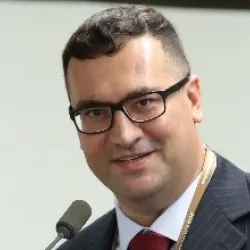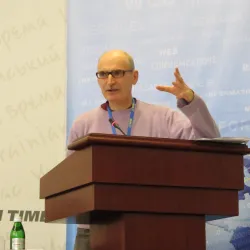2021 Big Data: New Opportunities in Economic and Statistical Analysis
Big Data: New Opportunities in Economic and Statistical Analysis
Big Data: New Opportunities in Economic and Statistical Analysis
March 8 - 11
Chair: Per Nymand-Andersen, Advisor, European Central Bank
Encompassing the dramatic rise of computational technology, big data empowers researchers to explore and understand complex statistical as well as economic challenges. In 2020 covid-19 created a global crisis and now more than ever, it is time to make the most of the opportunities Big Data derives. Big data is already transforming the financial industry: market players actively use data patterns from micro datasets to produce new and timely indicators. But, has Covid-19 created new opportunities and risks that central banks need to consider?
For central banks and regulators, big data opens up unprecedented possibilities. These include: enhancing financial stability assessments, applying new approaches to economic forecasting, as well as obtaining rapid feedback on their policies. Yet, in order to make the most of these new opportunities, the central banking and supervisory community still needs to overcome a number of methodological, technical and institutional challenges.
This course, “Big Data: New Opportunities in Economic and Statistical Analysis”, will look at key topics from best processes for data management and analytics, the opportunities the cloud brings for data management to what good governance looks like when managing big data.
Each day will feature three hours of expert-led live content to maximize the opportunity to share and learn. The Course chair will ensure participants have opportunities to network throughout the programme.
Global timezone: 11am-2pm (GMT) | 6am-9am (ET) | 7pm-10pm (SGT)
Big Data: New Opportunities in Economic and Statistical Analysis agenda
Foundations and building blocks of Big Data
11:00 – 11:15
Course introduction and participant welcome
11:00 - 11:15
- Introductions and welcome from the chair
- Overview of the training course and key themes
- Discussion of delegate expectations and particular areas of interest
|
Per Nymand-Andersen has over 25 years of Central Banking Experiences and was part of creating and developing the European Central Bank from scratch. Per has developed his expertise in banking and financial markets, fintech, data science, communications, securities settlement systems, statistics and Management. Per holds several Fintech/data science Advisor Board positions in private and simi-public organisations. Per is a Lecture at Goethe-Universität Frankfurt and is a frequent speaker at international events and author of several publications/articles regarding financial markets, data science, communication and statistics. His recent renown book “Data science in Economics and Finance for Decision Makers” was published by Riskbooks.com. Prior to joining the ECB, he provided market research consultancy services for the European Commission, Luxembourg. Per has an MBA in Economics and Management Science from Copenhagen Business School, Denmark and has a Fintech certificate from Harvard University. Per speaks four languages (English, German, French and Danish). Further details: https://www.linkedin.com/in/per-nymand-andersen-81609913 |
11:15 – 11:45
Overview of new data sources in economics and finance
11:15 - 11:45
- Big data and central banking – Purpose and use
- Fintech, data never sleeps
- Quality and transparency of new data sources
|
Per Nymand-Andersen has over 25 years of Central Banking Experiences and was part of creating and developing the European Central Bank from scratch. Per has developed his expertise in banking and financial markets, fintech, data science, communications, securities settlement systems, statistics and Management. Per holds several Fintech/data science Advisor Board positions in private and simi-public organisations. Per is a Lecture at Goethe-Universität Frankfurt and is a frequent speaker at international events and author of several publications/articles regarding financial markets, data science, communication and statistics. His recent renown book “Data science in Economics and Finance for Decision Makers” was published by Riskbooks.com. Prior to joining the ECB, he provided market research consultancy services for the European Commission, Luxembourg. Per has an MBA in Economics and Management Science from Copenhagen Business School, Denmark and has a Fintech certificate from Harvard University. Per speaks four languages (English, German, French and Danish). Further details: https://www.linkedin.com/in/per-nymand-andersen-81609913 |
11:45 – 12:00
Break
15:15 - 15:45
12:00 – 12:45
Big data and central banks
12:00 - 12:45
- Opportunities
- Organising big data work
- Challenges
- Policy issues with handling and using big data
Bruno Tissot is the Head of statistics and research support at the BIS and Head of the secretariat of the Irving Fisher Committee on central bank statistics (IFC). He has been working at the BIS since 2001, as Senior economist and Secretary to the markets committee of central banks in the monetary and economic department and then as the Adviser to the general manager and Secretary to the BIS executive committee. Between 1994 and 2001 he worked for the French Ministry of Finance. He is currently Head of BIS statistics and research support and is a graduate from École Polytechnique (Paris) and of the French Statistical Office INSEE.
12:45 – 13:00
Break
12:45 - 13:00
13:00 – 13:45
Machine Learning and Statistics: Variations on a Theme
11:15 - 12:00
- Machine learning and statistics
- Classifying data-analysis methodologies
- What are the limits of our predictive capacity?
- Pitfalls and hidden strengths of machine-learning methods
David Jamieson Bolder is currently head of the World Bank Group's (WBG) model-risk function. Prior to this appointment, he provided analytic support to the Bank for International Settlements' (BIS) treasury and asset-management functions and worked in quantitative roles at the Bank of Canada, the World Bank Treasury, and the European Bank for Reconstruction and Development. He has authored numerous papers, articles, and chapters in books on financial modelling, stochastic simulation, and optimization. He has also published a comprehensive book on fixed-income portfolio analytics. His career has focused on the application of mathematical techniques towards informing decision-making in the areas of sovereign-debt, pension-fund, portfolio-risk, and foreign-reserve management.
New challenges for Big Data and data management
11:00 – 11:45
Making sense of Big Data through Artificial Intelligence (inc. text mining)
12:00 - 12:45
- Big data - general introduction
- Big data information for central banks
-
Working with big data at central banks: Artificial Intelligence potential & main applications
-
Machine Learning
-
Network Analysis
-
Text mining
Bruno Tissot is the Head of statistics and research support at the BIS and Head of the secretariat of the Irving Fisher Committee on central bank statistics (IFC). He has been working at the BIS since 2001, as Senior economist and Secretary to the markets committee of central banks in the monetary and economic department and then as the Adviser to the general manager and Secretary to the BIS executive committee. Between 1994 and 2001 he worked for the French Ministry of Finance. He is currently Head of BIS statistics and research support and is a graduate from École Polytechnique (Paris) and of the French Statistical Office INSEE.
11:45 – 12:00
Break
15:15 - 15:45
12:00 – 12:45
Applying data science in economics and finance
12:00 - 12:45
- Data science models for large datasets
- Using predictive models in macroeconomics
- Case study: Working with big data, models, software and examples from Bank of Italy
Juri Marcucci holds a PhD in Economics from the University of California, San Diego. His doctoral thesis was on financial econometrics, under the supervision of Professor Robert Engle (winner of the 2003 Nobel Memorial Prize in Economic Sciences) and it focused on the predictive ability of Regime-Switching GARCH models and common features in volatility. He lectured at the University of Bologna, and Tor Vergata University of Rome and he is currently lecturing a course on “Data-Driven Economics” at the Sapienza University of Rome. He has been visiting scholar at the Federal Reserve Bank of Boston, University of California San Diego and Universitat Pompeu Fabra. He is the organizer of the Italian Summer School of Econometrics on behalf of the Italian Econometric Association (SIDE). He has been the Bank of Italy’s member of the Big Data Committee at the Italian National statistical institute. He has been guest editor of the journals Econometrics and the International Journal of Forecasting. He is co-organizing a series of webinars on Applied Machine Learning, Economics, and Data Science (AMLEDS).
He has worked at the Bank of Italy since 2004 where he has coordinated the task force on Big Data and Machine Learning since 2016. He is now working in the Research Data Center and Innovation Lab in the DG Economics, Statistics and Research. His research interests are on Big Data, Text Mining, forecasting and applied econometrics.
His work appeared in the J. of Econometrics, International J. of Forecasting, Studies in Nonlinear Dynamics & Econometrics, J. of Economics and Business, J. of International Financial Markets, Institution & Money, International Review of Financial Analysis.
12:45 – 13:00
Break
12:45 - 13:00
13:00 – 13:45
Visualisation: new tools and techniques for data storytelling
13:00 - 13:45
- Why is good data visualisation and storytelling important?
- Overview of best practise techniques
- How the Bank of England is using state of the art technology
- Examples of improved communication of financial data using these techniques and technology
- Discussion: where are the opportunities for central bank communication?
Effective use of Big Data
11:00 – 11:45
The building blocks of Big Data
12:00 - 12:45
- New applications of open source technologies in data collection, management and analysis
- Overview of key models and analytics frameworks
- Tips for management of sensitive issues in the areas of security standards and confidentiality
- Effectively managing large amounts of data
11:45 – 12:00
Break
15:15 - 15:45
12:00 – 12:45
AI and ML implications for data management and analytics
13:00 - 13:45
- Current capabilities of AI and machine learning
- Data management, processing and analysis
- Examples of machine learning based software solutions for the regulators and the regulated
- Discussion: what are the best opportunities in AML and CFT
Kimmo Soramäki is the founder and CEO of Financial Network Analytics (FNA) and the founding editor-in-chief of The Journal of Network Theory in Finance. He started his career as an economist at the Bank of Finland where he developed in 1997 the first simulation model for interbank payment systems. In 2004 while at the research department of the Federal Reserve Bank of New York, Mr Soramäki was among the first to apply methods from network theory to improve our understanding of financial systems. During the financial crisis of 2007-2008 he advised several central banks, including the Bank of England and European Central Bank, in modelling interconnections and systemic risk. This work led him to found FNA in 2013 provide solutions to monitor the complex financial networks that play a continually larger role in the world around us. Mr Soramäki holds a Doctor of Science in Operations Research and a Master of Science in Economics (Finance), both from Aalto University in Helsinki.
12:45 – 13:00
Break
12:45 - 13:00
13:00 – 13:45
Good governance: how should central banks manage Big Data
11:00 - 11:45
- Key approaches and challenges to successful governance of Big Data
- Framework for effective management of Big Data
- Strategies to balance oversight and promote innovation
- Discussion: How effective is existing data governance in coping with Big Data?
Eoin MacCuirc works for the Irish, Central Statistics Office (CSO) in Cork since 1994. Eoin works in Business Liaison and Quality Assurance, Technology Division and has responsibility for the coordination and management of Electronic Data Capture on Mobile Devices, the CSO Data Management System, rolling out Agile Project Management and Design Thinking across Technology Division and standardising the project management and governance of Technology Division projects.
Eoin has performed many roles in the CSO at all stages of the statistical production process. Eoin sits on many local, national and international working groups and present regularly at conferences at home and abroad.
Eoin sits on the National Public Bodies Advisory Group on Open Data, is a member of the ESS Open Data Committee and Working Group on High Value Datasets, a member of the Smart Dublin Advisory Network and Cork Smart Gateway and Programmable City Groups. Eoin was on the Eurostat DIGICOM steering group a cross cutting project on digital communication, user analytics and innovative products in the European Statistical System. Eoin led the CSO participation in the ESSnet on Linked Open Data to maximise the openness, linkability, analytical and machine accessibility of ESS statistical data. Eoin coordinated and managed the delivery of the ESS IT Security Framework throughout CSO. Eoin lectures in the Institute of Public Administration Diploma course in Official Statistics.
Besides his involvement in the traditional data analytics used in gathering, collating and publishing statistics Eoin has an interest in empowering expert and non-expert users to engage with and analyse statistical data in its many formats. Eoin led the CSO involvement in the Open Cube Project and a UNSD collaboration on spatially representing and visualising SDG indicators. Eoin is particularly interested in how machine readable data, web services and linked data formats will facilitate data analytics across data domains into the future.
Eoin studied Business and Social Studies in Trinity College, Dublin and is a trained project manager and IT System analyst.
Eoin is a native English speaker with basic communication skills in French.
Advanced uses of Big Data
11:00 – 11:45
Advanced Statistical Analysis of Large-Scale Web-Based Data
11:00 - 11:45
- Data science methods for big data
- Case study using social media data
- Challenges and learnings
11:45 – 12:00
Break
15:15 - 15:45
12:00 – 12:45
Cloud and data management: innovation and opportunities for central banks
13:00 - 13:45
- Examples of cloud applications in today's central banking environment, advantages and disadvantages
- Importance of cloud computing for data science and big data analytics
- Discussion: what does it take to effectively manage limitations and potential legal and security risks?
Maryam Haghighi is the Director of Data Science at the Bank of Canada, where she provides strategic leadership for data science, including artificial intelligence and machine learning, in support of Canada’s central bank’s mandate.
She has successfully led diverse teams, from academic environments to global enterprises and private partnerships, to solve complex data problems for multi-billion-dollar projects on the ground and in the skies.
Prior to joining the Bank, she pioneered the first ever space-based data analytics system of a new satellite constellation. As Canada’s delegate to international panels under the United Nations, she provided data and modelling expertise for the global aviation risk management.
Previously, she successfully applied her expertise to a diverse range of projects within the Government of Canada, in health care and in not-for-profits.
She holds a doctorate in Mathematics and a Master of Science in Applied Mathematics from the University of Ottawa. She was a professor of mathematics and computer science courses and has been a technical consultant in patent processes. She has a deep passion for interdisciplinary work as well as supporting women in technology initiatives.
12:45 – 13:00
Break
12:45 - 13:00
13:00 – 13:30
Closing remarks and delegate action plans
13:00 - 13:45
- Summary of the course
- Discussion of the observed trends and case studies
- Application of learning points in the delegates’ home organisations
- Preparation of action points
|
Per Nymand-Andersen has over 25 years of Central Banking Experiences and was part of creating and developing the European Central Bank from scratch. Per has developed his expertise in banking and financial markets, fintech, data science, communications, securities settlement systems, statistics and Management. Per holds several Fintech/data science Advisor Board positions in private and simi-public organisations. Per is a Lecture at Goethe-Universität Frankfurt and is a frequent speaker at international events and author of several publications/articles regarding financial markets, data science, communication and statistics. His recent renown book “Data science in Economics and Finance for Decision Makers” was published by Riskbooks.com. Prior to joining the ECB, he provided market research consultancy services for the European Commission, Luxembourg. Per has an MBA in Economics and Management Science from Copenhagen Business School, Denmark and has a Fintech certificate from Harvard University. Per speaks four languages (English, German, French and Danish). Further details: https://www.linkedin.com/in/per-nymand-andersen-81609913 |
Central Banking’s Post Training is a chair-led forum where participants can bring further questions or discussion points to group, after the live content and self-paced learning elements. What has worked, and what has not? Post Training focuses on questions that may have arisen since returning, the challenges of implementation and the setting of medium-term goals. Participants are encouraged to bring a short presentation, or questions on a particular topic, to gain the most from the discussions with peers.
15:00 – 16:00
Implementation Workshop
11:00 - 12:00
Benefits of attending the Implementation Workshop:
- Developments in the area since the live content sessions, including new resource material
- Questions arising since returning to the central bank
- Challenges of implementation: where are the roadblocks?
- Medium-term goals: what is realistic?
- Establishment of group network to keep in touch with peers and share best practices
Chair

Per Nymand-Andersen
Emeritus adviser
European Central Bank
|
Per Nymand-Andersen has over 25 years of Central Banking Experiences and was part of creating and developing the European Central Bank from scratch. Per has developed his expertise in banking and financial markets, fintech, data science, communications, securities settlement systems, statistics and Management. Per holds several Fintech/data science Advisor Board positions in private and simi-public organisations. Per is a Lecture at Goethe-Universität Frankfurt and is a frequent speaker at international events and author of several publications/articles regarding financial markets, data science, communication and statistics. His recent renown book “Data science in Economics and Finance for Decision Makers” was published by Riskbooks.com. Prior to joining the ECB, he provided market research consultancy services for the European Commission, Luxembourg. Per has an MBA in Economics and Management Science from Copenhagen Business School, Denmark and has a Fintech certificate from Harvard University. Per speaks four languages (English, German, French and Danish). Further details: https://www.linkedin.com/in/per-nymand-andersen-81609913 |






